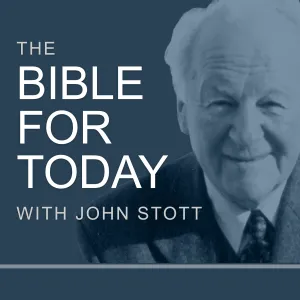
The Cause of His Death - Part 1
John Stott explains why God cannot simply forgive our misdemeanours, as we would forgive one another, and why it was necessary for Jesus to die for us on the cross.

The Conscience - Part 2
John Stott shows how as Christians we can put the cross of Christ between the devil and our conscience. But he also shows how it is possible to deaden our conscience to what God says which is what is meant by blasphemy against the Holy Spirit.

The Conscience - Part 1
John Stott shows us that our conscience is what makes us different from the animal kingdom. He explains the place of our conscience in Christian conversion, Christian relationships and Christian maturity.

The Mind - Part 2
John Stott shows us how we need to use our minds in order to worship God. He also shows us that using our mind is necessary when we place our faith in Him for salvation and encourages us to repent of 'anti-intellectualism' in our Christian life.

The Mind - Part 1
John Stott explains that the mind is the central citadel of the human personality that directs our human operations. He sets God's purpose for us to think before we act against the current trend of emptying our minds in order to meditate.

All By Myself - Part 2
John Stott shows us that if marriage is seen as a blessing, singleness should not be seen as a curse. He warns against believing that singleness makes us more spiritual and explains why it should not result in us being alone.

All By Myself - Part 1
John Stott examines the two statements of scripture: "It is not good for the man to be alone" Gen.1:18 and "It is good for a man not to marry" 1 Cor.7:8 and gives a frank and Biblical view on singleness.

Jesus, The Saviour of the World - Part 2
John Stott shows us that the message of Luke's gospel is good news of salvation, affecting both our past - through forgiveness of sins, and our future - by the giving of the Holy Spirit to indwell us every day.

Jesus, The Saviour of the World - Part 1
John Stott gives one aspect of the fourfold portrait of Christ as painted by Dr. Luke in his gospel record. He shows that no one is untouchable by Christ, the healer of broken lives and hearts.

God of Love - Part 2
John Stott shows us that if we have been born again we will manifest the nature of the God who has begotten us again and we should exhibit the love of the God we claim to know.

God of Love - Part 1
John Stott explains why we will never truly know what it is to be a human being unless we know the God who made us and why there is a huge difference between knowing about God and knowing Him personally.

The Bible; Trustworthy or Fallible? - Part 2
John Stott investigates how of the thousands who saw Jesus when He was on earth, some wrote eye witness accounts which we now have as the four Gospels.

The Bible; Trustworthy or Fallible? - Part 1
John Stott shows that in a world of relativism there is absolute truth to be found in the Bible, and why the Bible can be seen to be completely infallible.

The Cross and God - Part 2
John Stott explains that God's love is shown to us by the action he took in giving the most valuable gift possible in the person of His son Jesus.

The Cross and God - Part 1
John Stott shows how that the cross of Christ is not only a deed done for us but a word spoken to us. The cross demonstrates God's love to us despite our being completely undeserving of it.